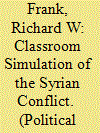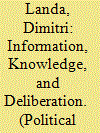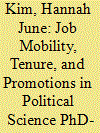|
|
|
Sort Order |
|
|
|
Items / Page
|
|
|
|
|
|
|
| Srl | Item |
| 1 |
ID:
168731


|
|
|
|
|
| Summary/Abstract |
The blended flipped classroom is a partially online, partially offline course to teach social science research methods. Online, students watch video lectures, do readings, and complete short exercises to acquire basic knowledge of research methodologies and academic skills. Being set up modularly, the online environment offers flexibility regarding not only when to study but also what to study: students choose the methods they find useful for their thesis project. They then apply these methods and skills in a series of face-to-face workshops, which incorporate several forms of active learning, such as small-group work, mini-games, and in-class writing. Although more demanding than a traditional lecture course, the blended flipped classroom has had a positive effect on student performance in the research methods course as well as in subsequent thesis projects.
|
|
|
|
|
|
|
|
|
|
|
|
|
|
|
|
| 2 |
ID:
168711


|
|
|
| 3 |
ID:
168729


|
|
|
| 4 |
ID:
168703


|
|
|
|
|
| Summary/Abstract |
From campaign rhetoric to tweets, President Trump has positioned himself as “disrupter in chief,” often pointing to administrative action as the avenue by which he is leaving a lasting mark. However, research on the administrative presidency begins with the premise that all presidents face incentives to use administrative tools to gain substantive or political traction. If, as this article suggests, Trump’s institutional standing differs little from his recent predecessors, then how much of the Trump presidency represents a change from past norms and practices? How much represents continuity, or the perennial dynamics of a far-from-omnipotent executive in an ongoing world of “separate institutions sharing powers” (Neustadt 1990, 29)? To answer this, we tracked presidential directives and regulatory policy during Trump’s first year in office. We found evidence of continuity, indicating that in its use of administrative tactics to shape policy, the Trump White House largely falls in line with recent presidencies.
|
|
|
|
|
|
|
|
|
|
|
|
|
|
|
|
| 5 |
ID:
168730


|
|
|
|
|
| Summary/Abstract |
Political science instructors increasingly use interactive pedagogies that emphasize active learning over traditional lecture formats. I contribute to this effort by developing a data-based teaching method that relies on student-generated data to illustrate course concepts and to serve as a foundation for a variety of activities in political science classrooms. This article summarizes the technique based on my experience in an introductory course in American government. However, given that this method is not intrinsically limited to any topic or area, I also provide examples of how the basic framework may be applied to other subfields in political science. I conclude by calling for the creation of a network of teacher–scholars interested in developing, sharing, and refining best practices related to data-based teaching.
|
|
|
|
|
|
|
|
|
|
|
|
|
|
|
|
| 6 |
ID:
168713


|
|
|
| 7 |
ID:
168712


|
|
|
| 8 |
ID:
168710


|
|
|
| 9 |
ID:
168705


|
|
|
| 10 |
ID:
168727


|
|
|
| 11 |
ID:
168719


|
|
|
|
|
| Summary/Abstract |
The use of duration models in political science continues to grow, more than a decade after Box-Steffensmeier and Jones (2004). However, several common misconceptions about the models still persist. To improve scholars’ use and interpretation of duration models, we point out that they are a type of regression model and therefore follow the same rules as other more commonly used regression models. In this article, we present four maxims as guidelines. We survey the various duration model interpretation strategies and group them into four categories, which is an important organizational exercise that does not appear elsewhere. We then discuss the strengths and weaknesses of these strategies, noting that all are correct from a technical perspective. However, some strategies make more sense than others for nontechnical reasons, which ultimately informs best practices.
|
|
|
|
|
|
|
|
|
|
|
|
|
|
|
|
| 12 |
ID:
168733


|
|
|
|
|
| Summary/Abstract |
The use of course-management software such as Blackboard, Moodle, and Canvas has become ubiquitous at all levels of education in the United States. A potentially useful feature of these products is the ability for instructors to administer assessments including quizzes and tests that are flexible, easy to customize, and quick and efficient to grade. Although computer-based assessments offer clear advantages, instructors might be concerned about their effect on student performance. This article evaluates whether student performance differs between handwritten and computer-based exams through a randomized field experiment conducted in a research methods course. Overall, our findings suggest a significant improvement in student performance on computer-based exams that is driven primarily by the relative ease of producing thorough responses on the computer versus by hand.
|
|
|
|
|
|
|
|
|
|
|
|
|
|
|
|
| 13 |
ID:
168716


|
|
|
|
|
| Summary/Abstract |
Gender representation is a pervasive problem in political science. We draw on evidence from the 2017 and 2018 American Political Science Association (APSA) Annual Meeting programs to discuss diversity and representation in large political science disciplinary conferences. APSA program divisions differ substantially in their gender representation: although some are representative of their organized-section membership, others are not, and some sections are particularly likely to feature “manels.” We present representation data by organized section, with discussions of what representation looks like and identifying different types of representation goals. We conclude by offering guidelines for increasing gender representation, for both future submitters and program chairs.
|
|
|
|
|
|
|
|
|
|
|
|
|
|
|
|
| 14 |
ID:
168709


|
|
|
| 15 |
ID:
168723


|
|
|
| 16 |
ID:
168718


|
|
|
|
|
| Summary/Abstract |
Using updated data from 2002 and 2017 on the political science discipline, we show how the cohort and gender composition of US PhD-granting departments has changed dramatically over time. Integrating 2002 and 2017 data, we examine overall patterns and gender differences in job mobility, tenure and promotion, and university prestige level among non-emeritus 2002 faculty, controlling for cohort effects. Even with this control, we find strong gender effects in some of these success dimensions. We then introduce another variable, citation counts, and find that women are consistently less cited than men, with important variations in the pattern across different cohorts. A control for citation counts show that some of these gender differences tend to disappear and we consider possible explanations for these findings.
|
|
|
|
|
|
|
|
|
|
|
|
|
|
|
|
| 17 |
ID:
168714


|
|
|
|
|
| Summary/Abstract |
Much has been written about efforts to expand women’s social, cultural, and political representation, roles, and opportunities. However, as political scientists, we have done little to document the early history of incorporating women into the discipline. This article illustrates how the General Federation of Women’s Clubs (GFWC) established the study of politics as an acceptable course of baccalaureate study for women: first, by crafting a model curriculum; second, by advocating for the creation of endowed chairs in political science at women’s colleges; and, third, by publishing in scholarly outlets. The GFWC’s efforts can be viewed as the first steps to the incorporation of women into the discipline—a question that continues to be the subject of much analysis and consternation by professional associations and the academic community.
|
|
|
|
|
|
|
|
|
|
|
|
|
|
|
|
| 18 |
ID:
168725


|
|
|
| 19 |
ID:
168721


|
|
|
| 20 |
ID:
168732


|
|
|
|
|
| Summary/Abstract |
Many students in my undergraduate American politics courses struggle to see policy issues as complex. Too often, they get stuck making surface-level observations or jumping straight to personal opinions, falling far short of critical thinking. This article introduces an active-learning exercise—situational mapping—that provokes students to recognize and think critically about the complexities of policy issues such as immigration, abortion, campaign financing, and guns. Adapted from a grounded-theory research technique, the goals of this mapping exercise are to (1) help students see policy issues as messy, (2) encourage them to “wallow in complexity” rather than oversimplify, and (3) provoke them to think through complexities before forming conclusions. The learning exercise actively engages every student, is simple to prepare and implement, can be completed during a 50-minute class, and is flexible in its application. It also involves teamwork, informal presentations, moving around the classroom, and opportunities for creativity.
|
|
|
|
|
|
|
|
|
|
|
|
|
|
|
|
|
|
|
|
|